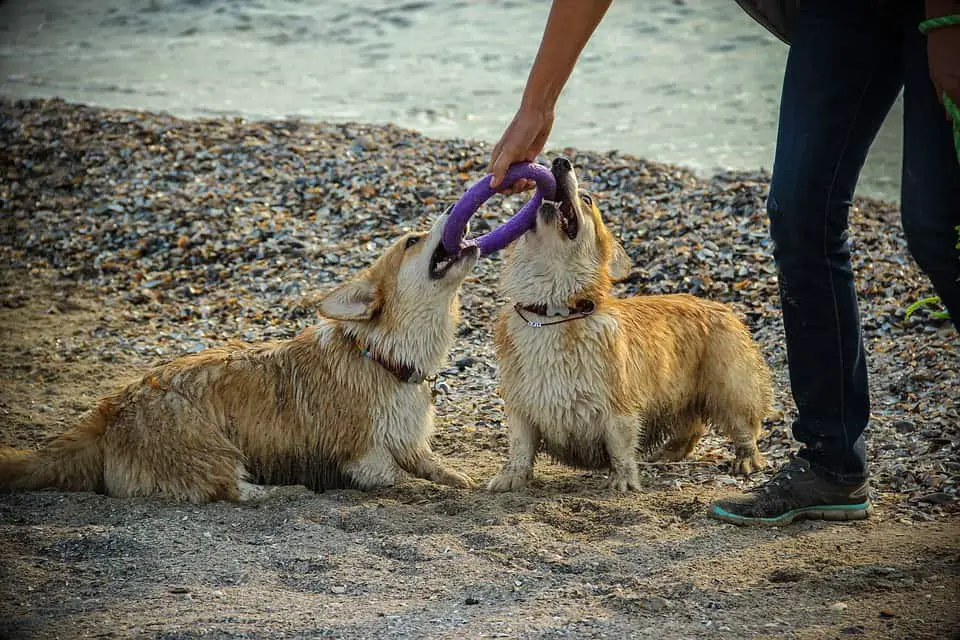
Corgis as a breed are not natural swimmers but they learn quickly and adapt well. Many corgis acquire a great fondness for aquatic activities. Since swimming is a low-impact activity, it is an excellent and easy-on-the-joints way to exercise for these short-legged dogs.
CORGI DOGS AND WATER ACTIVITES
Short Legs, Long Torso
Some owners of Pembroke Welsh and Cardigan Welsh Corgis feel uncertain of their pet’s ability to swim. It is reasonable to wonder if short legs make swimming harder.
The disproportionately short legs are not much of an issue. Corgis can swim, although they may be a little awkward at first. These dogs are athletic and bubbly. Swimming is an excellent form of exercise for corgis because it is low-impact and safe for these dogs’ hips and other joints.
Bright And High-Energy
Corgis were bred to be farm dogs, and they have all the traits to be excellent in that vocation:
- Corgis are among the smartest breeds
- They like to learn new things and have tasks to keep them busy
- They are surprisingly sporty and energetic, despite their peculiar physique
- They have great stamina
As long as your corgi can overcome the initial wariness around water, the dog will likely enjoy aquatic exercise, games, and swimming as a way to exercise.
Easy-To-Train
According to Stanley Coren, Pembroke Welsh Corgis are among the most intelligent breeds. They are particularly outstanding when it comes to their working intelligence, or capacity to learn new skills.
This is what that means in practical terms:
- You do not need to be experienced or skillful as a trainer to achieve good results when training your dog
- A corgi will show an understanding of a basic new command in less than 5 repetitions
- The dog will remember commands and skills even without regular practice
- It almost always takes only one time to state a command for the dog to respond, and the response of very prompt
- Unlike some less intelligent breeds, you don’t need to be close to the dog for a corgi to understand and respond to you
All those training-related considerations are important not only because you can teach the dog to swim. You can also teach your pet other relevant skills, such as commands, staying close to you for safety, and being well-behaved on the beach, in general.
Sociable And Friendly
Corgis are sociable and adaptable dogs. Like any dog, a corgi might need to get used to a new environment and explore the place to relax. It is important that corgis, as a rule, do very well in crowded areas, such as a beach. They are friendly toward other dogs and people.
Corgis are a vocal breed, so be prepared to respond if your dog is too reactive to the things around him or her. It is good if your pup listens to your commands and can self-regulate.
How To Teach A Corgi To Swim
It is easier to introduce your dog to water when your pet is still young but the methods are similar for dogs of any age.
The idea is to introduce your pet to water in a low-stress environment. The dog should begin to associate water and swimming with playing and having fun.
1. Start With Shallow Water
Kids’ or doggy pools are great to start with, very shallow water in a lake is also good.
- Start with playing with your dog to make your pet feel at ease.
- Spark your dog’s interest with a squeaky toy. See if your pup enters the water on his or her own, and whether or not you need to provide some guidance.
- Your dog might just start swimming instinctively while following your lead.
2. Train In A Familiar Environment With Few Distractions
A little kids’ pool in your yard or on your balcony could be a great place to start teaching your pet to play in the water for a couple of reasons:
- If your pet is easily distractible or anxious, a familiar environment makes it easier to focus and avoid all the distractions of a busy beach
- Starting in a low-stress and safe place allows the dog to build up confidence and gain new skills
3. Swim With Your Dog
Have fun with your dog! If other family members (human or canine) can join, that will help, too.
- Your pet is more likely to relax if he or she can follow your lead
- As with many activities, if another dog can join, that could be key to quick success! Dogs often feel more confident when they have canine company, especially if the other dog is comfortable in the water.
- Let your pet set the pace. Some dogs start swimming right away, others take a long time to get used to the idea.
4. Offer Positive Reinforcement
Positive reinforcement is essential in teaching a dog a new skill.
Treats could be important in the beginning but eventually, verbal praise should do the job, especially for such an owner-oriented breed.
It is important to praise and reward regardless of how much progress your pet is making, effort is what counts.
5. Read Your Dog’s Cues
If your dog seems uncomfortable, try another time.
Any encouragement should be limited to inviting the dog to follow your lead. It is okay to pause and try again later if the dog is not enjoying the process or seems distracted.
6. Prioritize Safety
Never leave the dog unattended even if your pet appears confident in the water.
Dogs often lose self-awareness when they enjoy an activity. Your pet may not be aware of his or her fatigue when retrieving a ball or a stick, for example. Many dogs also focus on pleasing the owner and refuse to stop despite fatigue.
7. Consider A Life Jacket For The Dog
Consider investing in a good life jacket for your pet if your dog swims in open water. Have your dog wear the jacket at home a couple of times before putting it on for swimming. Dogs often need to get used to wearing a new item, especially one as bulky as a life jacket.
8. Keep Your Pet Hydrated To Prevent Him From Drinking Sea Or Lake Water
Staying hydrated is important in general but it also reduces the amount of sea, river, or lake water that your dog will drink inadvertently while swimming.
Salty sea water is not good for the dog and can cause nausea and vomiting. Dogs tolerate lake and river water better but there is a risk of ingesting some bacteria that way, so it is also not ideal.
9. Protect Your Dog From Heatstroke
Being close to the water can be a great way to cool down in the summer but spending a day on the beach in hot weather can still be challenging for people and dogs alike.
Corgis are a heat-sensitive breed, so it is important to plan accordingly when you are going to spend a day out on the beach with your pet. Please read our post on keeping corgis cool in hot weather.
Related Questions:
Can Corgis Run? While corgis enjoy sprinting, distance running could be challenging for them. Like any other high-impact activity, running puts stress on these pups’ joints and backs, and that is one of the main reasons for caution. A healthy adult corgi should tolerate running in moderation, and there are things you can be mindful of to promote safety and comfort for your corgi on the trail.
Can Corgis Go Hiking? A healthy corgi aged about 1 through 7 years typically tolerates an easy to moderate hike very well. Pick a route that does not have any steep hills to ascend, and a distance of 5-6 mi ( 8-10 km) is likely to be comfortable for your corgi. Go on a day not warmer than 70°F (21°C) and make sure to provide drinking water for your dog.
Recent Posts
Clown Killifish Clown Killifish (Epiplatys annulatus) are great fish for beginners, as well as people who want to avoid having a lot of equipment for their aquariums. They do well in community...
Border collies, and other herders, such as Shelties, Aussies, and corgis, are bright and energetic family pets. It is wise to consider if your household is the right fit for these dogs. You may...

